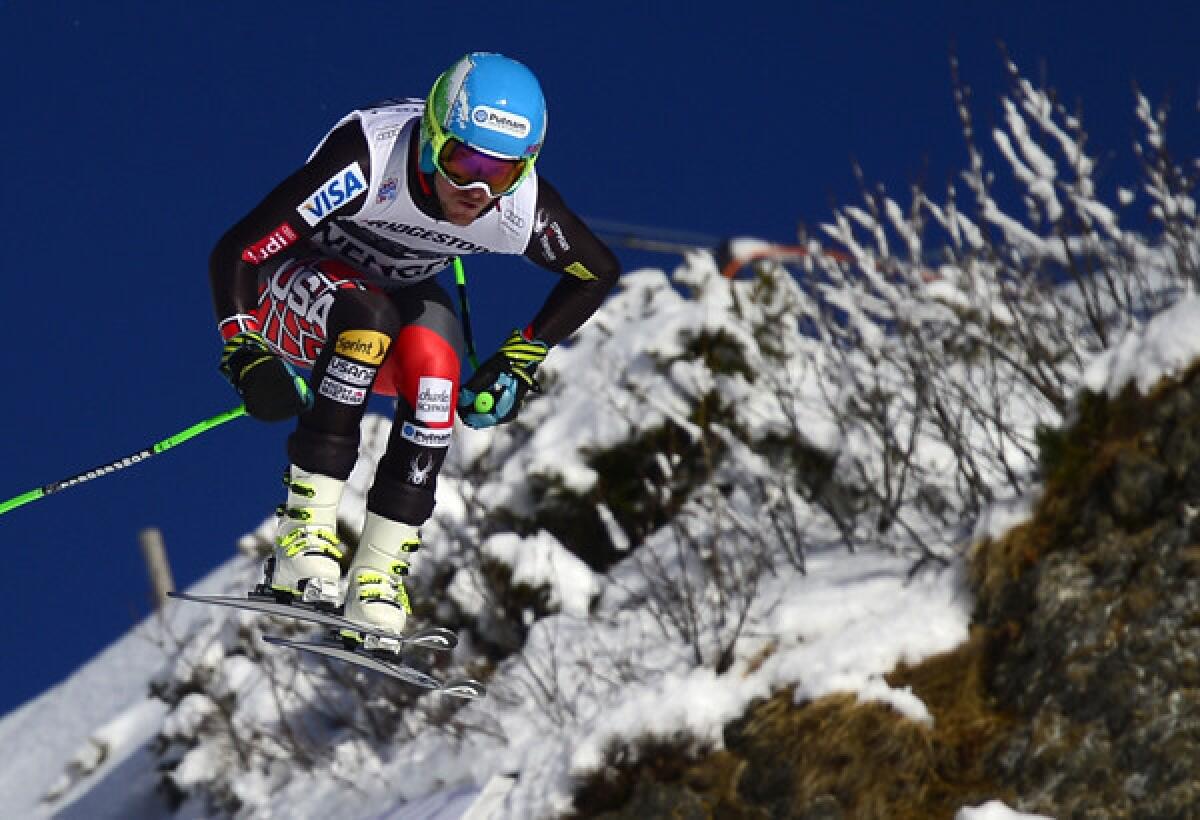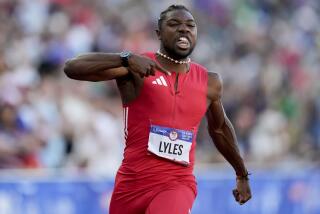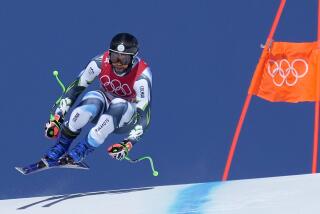Ted Ligety’s giant slalom mastery as a course to stardom

The new face of the U.S. men’s Alpine team has never skied “wasted,” a la Bode Miller, but he has skied feeling sicker than a dog.
The face, in fact, could have used a box of tissues as he sniffled through an interview last November at training camp in Colorado.
Ted Ligety had a cold.
“Not just a little bit of a cold,” he said.
In his sport, the snow must go on.
“It’s just such a big part of ski racing, I’ve raced sick so many times,” he said. “It’s not really a big deal. You just deal with it.”
In 2006, he had flu before a super combined race at a pretty big international event in the Italian Alps — it was called the Olympics.
Shivering and feverish, Ligety shocked everyone by stealing the gold medal from teammate Miller and Austrian star Benni Raich.
At a race last year, Ligety needed a hospital visit and an IV just to make it to the starting gate — and finished fourth.
“A lot of racers have some of their best days when they’re sick,” Ligety said.
Watch out, Sochi, if next month Ligety turns up sicker than a Siberian husky.
Illness, he said, can narrow one’s focus.
“You don’t waste energy on all the other frivolous stuff going on around you,” he said. “You have to take so much mental energy to get yourself going you take more risks and push yourself harder because you know that’s the only chance you have.”
It wasn’t long after that interview that Ligety started appearing in commercials for a nighttime (and daytime) cold medicine.
Despite his out-of-nowhere gold medal in 2006, at age 21, Ligety did not displace Miller as centerpiece of the men’s Alpine team.
Miller overcame his 0-for-Italy performance because he has a soap operatic stage-presence advantage over Ligety and, at any given time, is also the world’s best ski racer.
Miller rebounded four years later in Vancouver, Canada, with Olympic gold, silver and bronze, while Ligety failed to medal.
It took until last year for the official takeover. With Miller sidelined all season after knee surgery, Ligety shredded the Alpine World Cup circuit.
He took his specialty, giant slalom, to another level. He won six of eight possible World Cup races, some by ridiculous margins. He claimed a GS race in Soelden, Austria, by 2.75 seconds, which is like lapping the field in the mile run.
At the world championships in Austria, Ligety became the first skier since Jean-Claude Killy in 1968 to win three gold medals.
Ligety enters Sochi as a prohibitive favorite in the GS. His dominance is close to jaw-dropping. Nineteen of his 20 career World Cup wins are in his signature event.
“I would say that of all the skiers in all the disciplines, he stands out the most in his discipline,” former U.S. ski team racer Steve Porino, now an analyst for NBC, said. “It’s high art, in that other people can watch it, other people can understand it, other people can reason through it, but just can’t do it.
Giant slalom is considered the purest discipline, a combination of speed, grace and technique.
“You just can’t be a great athlete, you can’t just be big and strong, you can’t just be ridiculously quick,” Porino explained. You really have to have it all. It’s the art of skiing, and the hardest to harness.”
It is difficult to convey to casual observers what makes Ligety tick. Simply put, Porino said, he can carve more arc between gates. The discipline is a perfect fit for his natural turn cadence. He slides less than his competitors and makes up more time.
Ligety grew up on the slopes of Park City, Utah, developed his technique in 2005 and mastered it long before the competition began trying.
Knowing the competition gap will eventually tighten, Ligety is looking to clean up precious medals while he can.
He will not correlate his breakout success last year with Miller’s absence on tour.
“I wouldn’t say it affected my racing one way or another,” Ligety said.
The skiers, as personalities, are as opposite as bookends.
Ligety said he welcomes Miller’s return to the circuit, and the Olympics, this year.
“Everyone wants to talk about Bode, which is fine,” Ligety said. “He’s an intriguing person.”
But isn’t this now Ligety’s team?
“I think any time Bode’s around, he’s the star,” Ligety said. “He’s done a lot more than I have in the sport, for sure. I’m still a long way off from his career achievements. He is an extremely interesting story and an extremely interesting personality. I’m perfectly fine with that.”
Miller, who at 34 has a five-year life advantage, admires Ligety but still acts like the older sibling who refuses to let his kid brother win in checkers.
Only Miller, in his inimitable way, could pay Ligety a genuine compliment by saying, “He has no one to blame for his success except himself.”
In Bode’s world that means Ligety invented his own style of skiing (as Bode did) and stuck to it (as Bode did).
“I think he really loves that he’s a much better GS skier than I am right now,” Miller joked. “At the same time, I think he feels the pressure still, because he sees the way I ski and he knows. ... “
Ligety knows too that the Olympics are a one-trick crapshoot.
His 2006 Olympic win took an extraordinary set of circumstances. Miller won the downhill portion of the combined and basically had to stand up in two runs of slalom to secure the gold. But Miller missed a gate and was disqualified.
It then became Raich’s race to lose, and he lost it with a DQ.
Ligety, only 21, coughing and wheezing, became only the fourth American male to win gold in Alpine.
The crapshoot turned on Ligety four years ago when he finished ninth in the Olympic GS race he was expected to win.
Ski racers notoriously couch Olympic expectations because they know their fates are often tied to the ski gods of weather, snow conditions, bib draws and course setup.
In fact, pre-race Olympic favorites have historically foundered.
Winning a World Cup event “globe” is much more indicative of a skier’s place in the sport because, Ligety says, “It’s a compilation of your entire season. You have to be good in a bunch of events throughout the entire year.”
That said, a gold in combined, which is sort of a concocted Olympic event, is different from gold in giant slalom.
If Ligety is the king of GS, which he is, doesn’t he need that crowning Olympic achievement?
“Obviously, the expectations are a lot higher this time around, but I think I’m in a much better place, my skiing, but also mentally,” Ligety said.
After his performance at last year’s world championships, though, people now expect the world of Ligety.
More to Read
Go beyond the scoreboard
Get the latest on L.A.'s teams in the daily Sports Report newsletter.
You may occasionally receive promotional content from the Los Angeles Times.











